A shadow cabinet is a group of senior opposition members who scrutinize and challenge the policies of the current government, offering alternative solutions. It plays a crucial role in maintaining democratic accountability by holding ministers to account. Discover how the shadow cabinet influences politics and why it matters to your understanding of governance in the full article.
Table of Comparison
| Aspect | Shadow Cabinet | Kitchen Cabinet |
|---|---|---|
| Definition | Official opposition's group mirroring government ministers. | Informal, trusted advisors to the head of government. |
| Function | Scrutinizes government policies and offers alternatives. | Provides confidential advice outside formal channels. |
| Formality | Formal, recognized political structure. | Informal, often unofficial advisory group. |
| Transparency | Publicly known members and roles. | Usually secretive or private membership. |
| Political Role | Opposition party's official strategy team. | Advisors influencing government decisions discreetly. |
| Accountability | Accountable to opposition party and public. | Limited accountability, often informal. |
Understanding the Shadow Cabinet
The Shadow Cabinet consists of senior members from the opposition party who scrutinize and challenge the policies and actions of the sitting government, mirroring each ministerial role. It serves as a critical component in parliamentary systems, enabling effective accountability and offering alternative policies to voters. Understanding the Shadow Cabinet reveals its role in promoting democratic transparency and preparing the opposition for potential governance.
Defining the Kitchen Cabinet
The Kitchen Cabinet refers to an informal group of advisors who wield significant influence over a political leader, often operating outside official channels and formal government structures. Unlike the Shadow Cabinet, which is a recognized opposition team mirroring government positions, the Kitchen Cabinet provides behind-the-scenes counsel that shapes policy decisions and political strategy. This informal advisory body can include trusted friends, political allies, or experts whose input heavily impacts governance without the transparency or accountability of formal institutions.
Historical Origins of Both Cabinets
The shadow cabinet originated in the United Kingdom during the 19th century as a formalized opposition group mirroring the official government cabinet to provide accountability and alternative policies. The kitchen cabinet dates back to United States President Andrew Jackson's administration in the 1820s, referring to an informal group of trusted advisors who influenced decisions behind the scenes, bypassing the official cabinet. Both cabinets highlight contrasting approaches to governance, with the shadow cabinet emphasizing structured political oversight and the kitchen cabinet representing informal power dynamics.
Key Functions and Roles
The Shadow Cabinet functions as the official opposition's team, mirroring government ministers to scrutinize policies and hold the ruling party accountable in parliamentary democracies. The Kitchen Cabinet, by contrast, consists of informal advisors who influence a leader's decisions behind the scenes, often without official positions or public accountability. While the Shadow Cabinet plays a formal, transparent role in political oversight, the Kitchen Cabinet operates covertly, focusing on strategic counsel and personal influence.
Composition and Membership
A shadow cabinet consists of senior opposition party members who mirror the official cabinet roles, providing alternative policies and holding the government accountable. Its composition includes designated shadow ministers corresponding to each government department, often selected by the opposition leader to reflect expertise and readiness for governance. The kitchen cabinet refers to an informal group of advisors or confidants chosen by the executive, typically outside formal government structures, providing unofficial counsel and influencing decision-making.
Influence on Government Policy
Shadow cabinets play a critical role in shaping government policy by providing structured opposition and holding the ruling party accountable through formal critiques and alternative proposals. Kitchen cabinets influence government policy more informally, consisting of trusted advisors who offer confidential guidance and help the executive make strategic decisions outside official channels. The shadow cabinet's impact is institutional and public, while the kitchen cabinet's influence is personal and often secretive, shaping policy behind the scenes.
Transparency and Accountability
A shadow cabinet operates as an official opposition body mirroring the government's cabinet, ensuring transparency by publicly scrutinizing policies and holding ministers accountable through formal parliamentary processes. The kitchen cabinet, however, consists of informal advisors who influence decisions behind closed doors, often lacking transparency and escaping formal accountability mechanisms. This informal nature can undermine democratic oversight by concentrating power without clear public or institutional scrutiny.
Public Perception and Criticism
The shadow cabinet is publicly perceived as an official, organized opposition team providing accountability and alternative policies, which often earns it formal respect and media attention. In contrast, the kitchen cabinet faces criticism for operating informally behind the scenes, raising concerns about transparency, favoritism, and bypassing official advisory channels. Public skepticism toward the kitchen cabinet centers on its unofficial influence, while the shadow cabinet is generally viewed as a legitimate democratic institution.
Notable Examples in Political History
The Shadow Cabinet in the United Kingdom features notable figures like Margaret Thatcher, who served as Shadow Secretary of State for Education before becoming Prime Minister, while the Kitchen Cabinet, an informal group around President Andrew Jackson, included trusted advisers such as Martin Van Buren. The Shadow Cabinet operates within parliamentary systems as an official opposition alternative to the government's executive team, whereas the Kitchen Cabinet reflects informal power dynamics outside formal constitutional roles. These examples highlight contrasting approaches to political influence and governance in democratic histories.
Comparative Analysis: Shadow Cabinet vs Kitchen Cabinet
Shadow cabinets consist of opposition party members who scrutinize government policies and propose alternative solutions, whereas kitchen cabinets are informal advisory groups close to the executive, often wielding significant behind-the-scenes influence. Shadow cabinets operate within parliamentary systems, enhancing political accountability and policy debate, while kitchen cabinets function in presidential or semi-presidential systems, shaping decisions without formal authority. The shadow cabinet's transparency contrasts with the kitchen cabinet's secrecy, affecting public trust and political dynamics.
Shadow cabinet Infographic

 libterm.com
libterm.com